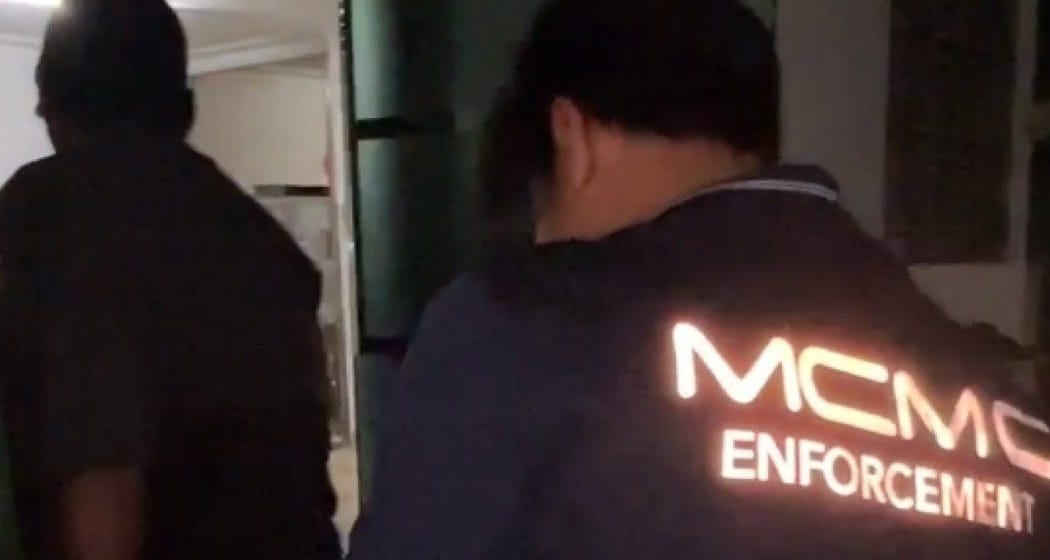Worrisome Implications of Malaysian Action Against Australian Journalist
Scribe loses defamation case without ever knowing it was filed
The judgment handed down against independent Australian journalist Murray Hunter on October 15 in a Kuala Lumpur suburban court for allegedly defaming the Malaysian Communications and Multimedia Commission (MCMC) – apparently without informing Hunter of the case – adds to deep, growing concerns about the government’s crackdown on free expression.
Hunter told Asia Sentinel he had been blindsided by the defamation action and hadn’t been informed it was coming. He has never received any documents related to the suit, he said, but added that he thought the action was beyond the MCMC’s regulatory responsibilities. “I have never been served any documents and only learned about the matter when a friend informed me,” he said in a WhatsApp chat. “At the moment I’m facing a similar suit in another country and it’s my priority to fight that first.”
At this point, he said, he has no idea what penalties the court may levy against him. He hasn’t been contacted personally, and there was no one in court to act for him.
Authorities have expanded censorship controls against the press, proposed amendments to expand repressive powers including the colonial-era Sedition Act and the 1998 Communications and Multimedia Act, charged at least one activist with sedition, sought to shut down what is considers “non-compliant” social media platforms, blocked the publication of critical reports by news portals and interfered with the operations of its own government-controlled mainstream media.
Social media platforms with at least eight million registered users – Facebook, YouTube, Instagram, WhatsApp, TikTok, Telegram, Pinterest, Snapchat, Reddit, and X (formerly Twitter) – in other words all of them – have been required to apply for a license to operate, shifting the responsibility for managing what it considers harmful content from individuals to the platforms themselves. The MCMC in 2025 has reportedly led 54 investigations including arrests, questioning, prosecutions, detecting videos, and the imposition of fines on dissenting voices.
Certainly the 66-year-old Hunter, writing on his Substack blog, has waged an unremitting campaign against Prime Minister Anwar Ibrahim’s Pakatan Harapan coalition government, frequently predicting its demise, and singling out Mohamad Salim Fateh Din, reappointed chairman of the MCMC earlier this year, for particular criticism, to the point where he has alienated some of his own allies and triggering the government action. The MCMC has long blocked access to Hunter’s blog, although it can be accessed by subscription.
“Apparently, the MCMC’s feelings got so bruised that they decided to dip into our pockets to sue people for saying mean things,” said Kamsiah Haider, a prominent social activist and dentist in Kuala Lumpur, on her Facebook page. “The high court basically told them, ‘You’re not a private citizen with hurt feelings – you’re a government agency, not Taylor Swift. If someone criticizes you, don’t cry lawsuit – just issue a statement, clarify, or better yet…fix the problem.’”
But the actions taken against Hunter, an academician and development specialist who has battered Anwar unmercifully from his perch in southern Thailand for the better part of five years, have sent shock waves through the press community. Prior to the defamation decision this week, he was arrested by Thai police on September 29 on criminal defamation charges, apparently at the behest of the MCMC, and jailed for 30 hours, spending the night sleeping on the floor.
In a statement carried by the national news service Bernama, the MCMC said “The Shah Alam High Court’s ruling finding Murray Victor Hunter liable for defamation in a suit brought by the (MCMC) reaffirms that free speech is not an absolute right; it must be exercised responsibly and is contingent upon legal boundaries,’ and that “the judgment serves as a clear legal precedent that the right to express opinions does not confer a license to make false, malicious, or defamatory statements that harm the reputation of others.”
Thai Lawyers for Human Rights, Pen International, Malaysia’s Center for Independent Journalists, Lawyers for Liberty, Global Voices, and other human rights and press organizations have expressed concern over Hunter’s predicament.
“Government agencies have no business to sue the public for criticism made against them,” said Latheefa Koya, a prominent lawyer and human rights activist and co-founder of the NGO Lawyers for Liberty, in a prepared statement. “If the people in charge of MCMC think anyone has made a false statement about it, the right thing for them to do is issue a statement denying or explaining or clarifying. But it is not acceptable for a public-funded agency to sue people for defamation, because this will have a chilling effect upon public discussion of the actions of MCMC. They have to stop acting like they are a private person whose feelings are wounded by criticism.”
Public institutions like MCMC, “funded by taxpayers, should be open to scrutiny and criticism, as a cornerstone of accountability and a fundamental principle in any democracy,” said the International Freedom of Expression Exchange (IFEX), a global network of organizations defending freedom of expression. “Where are the checks and balances for the institution’s actions, particularly in the face of the regional and international community? Who is responsible for holding MCMC accountable when its powers are used in ways that might threaten constitutional freedoms?”
Hunter called the action against him a SLAPP suit – a “strategic lawsuit against public participation” – designed to keep him from reporting on corruption and mismanagement. The actions, he said, have restricted him from writing about the MCMC, Malaysian corruption or Malaysian politics, the budget, the upcoming ASEAN Summit, or the important state election in Sabah possibly slated for November. His Substack blog is blocked in Malaysia by the communications ministry. (Hunter previously wrote for Asia Sentinel but the relationship was severed after he started his own blog.)


